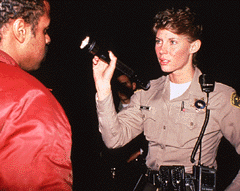GOLDSEA | ASIAMS.NET | ASIAN AMERICAN PERSONALITIES
SECOND ACT FOR A BADBOY
PAGE 4 OF 5
| "He was aware of a couple of factors, that I had graduated from Harvard and had worked for the National Enquirer, which is a good training ground." |
Q: What were your career aspirations in college?
A: After my mother had convinced me not to go directly into post-graduate
studies, I really was interested in getting into the entertainment business.
From 1977 I knew that I wanted to be in the entertainment industry. I
tjust took me a long time to get there.
Q: After you received your undergraduate degree, you worked for two years
as a reporter for the National Enquirer. How did that come about?
A: Truthfully, they had posted an ad at Harvard and so I just answered it. I
was a kid looking for a job, frankly.
Q: What did your duties at the tabloid entail?
A: The whole range of whatever the National Enquirer does. I went to
South America and chased UFOs, and I did everything from diets to movie
star stories to investigative reporting on supermarket packaging.
Q: Did you successfully track down any UFOs in South America?
A: No, but I interviewed plenty of legitimate people who swear up and down
that they saw them. I never personally saw them though.
Q: After your stint with the National Enquirer, you returned to
Harvard, earned your MBA and went to work as an investment banker. How
did that work out?
A: That wasn't a very fun job. I did that for a year and a half. I decided it
wasn't for me.
Q: What did you do next?
A: I tried to get into Hollywood, without a whole lot of success. Then I
decided to write to this guy named Murdoch in 1983 or 84, and much to my
surprise, after seven rejections from the big studios, he personally answered
my letter and that was the beginning of a long run with News Corp [the
parent company of Fox Inc]. And the run's still going.
Q: How did your relationship with Murdoch begin?
A: His office said to come by for an interview.
Q: Was that in Los Angeles?
A: No, that was in New York City. He had no presence in LA then.
Q: What happened during the interview?
A: It was very simple. He's a very fast, intuitive person. He met me and
semi-glanced at my resume but he was aware of a couple of factors, that I
had graduated from Harvard and had worked for the National
Enquirer, which is a good training ground. He thought it was interesting,
and I wasn't the most important hire of the day, so he said, "OK, let's get
started."

Chao himself conceived the Fox hit series Cops.
Q: What was your first position?
A: I was a vice president of acquisitions. I worked on buying companies.
With an MBA background, that's the kind of thing you do. I worked on
buying Fox and Metromedia.
Q: That sounds like a position of fairly significant responsibility.
A: It was not insignificant. Obviously I had more important
influence later on during the 90s.
Q: How did you move into the arena of programming?
A: In the first interview, I had told [Murdoch] that my ambition had always
been to be involved in some form of Hollywood -- television or the movies.
At that moment, I had my mind set on movies. The fact that it turned out to
be television was circumstance and situation, but in 1984, during that
interview, I said I'd really like to be in the movie business.
Q: How did he respond to that?
A: He said, 'Well, first we have to buy a movie company and then we'll see
what happens.' And that was enough for me, especially since all of the
major studios had already rejected my applications to work on the creative
side. There was more promise in joining News Corp than there was sitting in
my apartment and watching television.
Q: Did you watch a lot of TV and movies when you were growing up?
A: I would say Andy of Mayberry was the pinnacle for me. I thought it was
the greatest show on earth. It had everything. It's just so wonderful. It had
warmth, it had drama, it had comedy, it had adults, old people, drunks. And
it wasn't stupid. It was great.
PAGE 5
CONTACT US
|
ADVERTISING INFO
© 1996-2013 Asian Media Group Inc
No part of the contents of this site may be reproduced without prior written permission.
